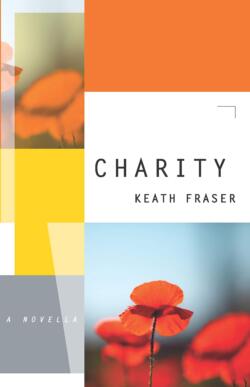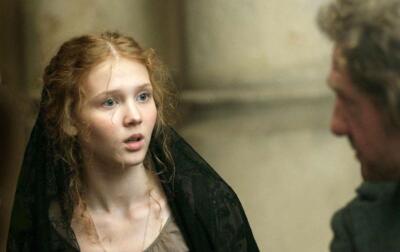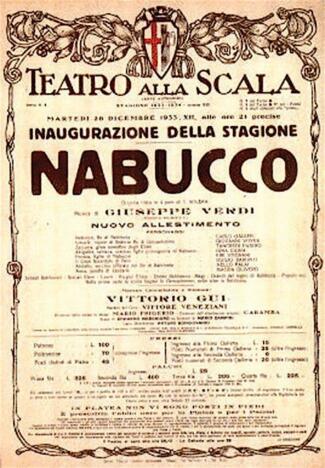1260 A subtle sequence of allusions
Charity
by Keath Fraser
Windsor, ON: Biblioasis, 2021
$17.95 / 9781771963800
Reviewed by Theo Dombrowski
*
 Who would express grief at a beloved’s death by simply saying, “and oh/ The difference to me?” William Wordsworth would, and does, in a short, tragic ballad. Is it just coincidence that Vancouver author Keath Fraser concludes his novella Charity in a bleakly similar way? “It would have made all the difference to us both.”
Who would express grief at a beloved’s death by simply saying, “and oh/ The difference to me?” William Wordsworth would, and does, in a short, tragic ballad. Is it just coincidence that Vancouver author Keath Fraser concludes his novella Charity in a bleakly similar way? “It would have made all the difference to us both.”
The raw understatement and the fact that such understatement, indirection, and compression inflect the quiet grief in both stories are significant. Keath Fraser’s novella is both greatly distilled and yet complexly interwoven with allusions, conceits, and parallels. If this were a movie, these might be called “easter eggs,” the term given to small treasures sitting quietly in the undergrowth of the narration.
Possibly, the book achieves its full impact on a reader who happens to share (or is willing to pursue) the author’s knowledge of, amongst other things: popular culture of the sixties and later, Vancouver, its landscape and its restaurants, Schubert and Verdi, modern poets, Goethe’s Faust, a particular Grimms’ fairytale, and, most important, Shakespeare’s King Lear.
However, besides reading Fraser’s book for its engaging and unusual storyline, or its “easter eggs,” many will be caught up by its humour, and, in addition, for its quicksilver handling of narrative pace and perspective. From all three of these angles, the novella seems so much more than a novella. On the contrary, it seems like a full, rich novel that, through a sleight of hand, happens to cover just over a hundred short pages.

Like so much else in the book, the storyline itself turns its back on the ordinary. The romantic couple with which the story begins is, well, unusual. He, Rudy, is not just old, but very old. She, Margaret (also called “Greta,” as we deduce) is young. She is also heavy. Monstrously heavy. She laughs a lot. Very, very loudly. Not a mere May/August couple, they are, in the words of the narrator, a March/December couple. Their relationship having prospered doing charity work (remember the book’s title?), they head to Africa for more. According to Margaret, Rudy falls ill; also according to her, she nurses him through this long illness until she returns, much diminished, to Vancouver. Rather than satisfying her father by going back to study medicine so she can become the partner in his clinic, she struggles. Enter Judy, her birth mother.
But such an outline of the story is misleading. Amongst other things, it suggests that Margaret is the centre of the story. She is, in a way, but only in a way: in fact, it is her stepmother, Denise, who tells the story until she finds herself (in spite of herself, we feel) telling us about her own childhood, her odd childhood relationship with Rudy, her growth to adulthood, and her non-marriage with Patrick. Margaret is there, somewhere, struggling, but pretty much outside the direct viewing lens of the narration.
Clearly, the story is off centre; but it feels even more off centre than such an outline suggests because of what Fraser does with his narrator, Denise. Utterly frank, Denise is, in Fraser’s hands, also narratively nimble, wielding ellipsis, indirection, and nearly cryptic fragments, and, most oddly, dropping bomb shells with nary a blink of the eye. Fraser challenges his readers, even as he entertains them. And entertains them he does hugely — in many different ways.
First, he shrouds Margaret’s life after Africa in mysteries that Denise — and the readers — must try to penetrate. Simultaneously, he gives stepmother and daughter complexly human, complexly felt lives. Neither lives life lightly; both feel. A lot.
In addition, the book is funny. More accurately, it is witty. The first part in particular bristles with many different kinds of wit. One of these is the misalignment of colloquialisms with tone: to a long, technical description of a dire medical condition, for example, Denise reacts bluntly, “It sounded like curtains.” Hilariously, Fraser also loves to couple incongruous concepts, writing, for example, of Rudy’s refusal to be the kind of retiree who would live off his “golfing handicap and an RRIF.” Elsewhere, he gives a dark twist to banal colloquialisms. Scattering funeral ashes becomes, in his words, “out of the cooking pot into the ether.” It helps his case that both Patrick and Judy are as sardonic as Denise. Thus Judy might (and does) say of her daughter, “I can’t get her to drop it….or drop by.”
Even grim assertions can be buoyant with such word play. Reflecting on Rudy’s job, Denise assures us that “he made a good living out of air conditioning only to suffocate her with his last gasps.” Fraser’s — and Denise’s — favourite form of wit, though, is extravagant overstatement. Of her stepdaughter’s penchant for long-distance ocean swimming, Denise coolly observes, “If she ever went down she’d go down with guns blazing in her body-positive swimwear.”
Body-positive swimwear? A satiric tone and a satiric prod are often embedded in Denise’s manner — to the point, in fact, that clearly Fraser has decided to make her an adept mouthpiece for some of his own arched-brow observations. Claptrap and posture seem his particular bane, especially when connected with overblown political correctness or “wokeness.” The very fact that he has “appropriated” the voice of a woman as a narrator says something about his breezy disregard for some kinds of caution.
Irked by inconsistency in public policy, Denise mutters about Vancouver’s ban of open air burning while simultaneously making the air choking-thick with fireworks festivals. Elsewhere she happily reports Patrick’s saying, “Since society was bending over backwards lately for transgenders, he [Patrick] wouldn’t be at all surprised to hear from some emeritus dean slipping sherry at his club that his [obese] daughter got into medical school solely on affirmative action.” Most searing, though, is an extended passage on what appears to be Remembrance Day celebrations, underscored by Denise’s indictment of the claptrap behind the war heroism concocted “to ennoble a vague quest called freedom.” In the whole extended, angry passage Denise — and Fraser — don’t hold back.
Manifestly, Fraser treats his readers to a shrewd, articulate, and intelligent narrator — but also one who is guarded about her own life and, as it turns out, private sorrows. Even major facts of her own story she manages to tuck into the recesses of her narrative. When, for example, she says of girdles, “For a while I had tugged one on against Barry,” she says nothing about who Barry is. Even later, poor Barry gets short narrative shrift — though, as with so many such oblique fragments of narrative, this one acts as shorthand for a whole force field of a suggested, but only suggested, life.

It is not just with these narrative details that the reader must connect the dots, but also in responding to the book’s ideas. The title of the book, of course, is the carrot. Charity? Treated primarily in the sense of good works, the notion acts as a touchstone, first, for Margaret and Rudy’s work with the homeless, and, then with Doctors Without Borders in Africa. The notion is enriched, though, through its association with the Biblical triad, faith, hope and charity.
In this latter case, charity as a kind of love connects both with the characters’ values and with Denise and Patrick’s earnest attempts to come to terms with the ethics driving the behaviour of their daughter and the old man, especially the role of charity in their behaviour towards each other in Africa. Dry about being (or not being) an “ethical whizz kid,” Denise says little about faith except to point out the difficulty of Margaret’s being “faithful” to her future. Pointedly, though, Denise challenges the much-quoted passage from Corinthians about charity (or love, depending on the translation) by insisting that the “greatest of these is hope.” Far from being pat or methodical in his treatment of his titular theme, Fraser lets the idea of charity flicker through the narrative (even to the point, of course, of making sure it pops up in the form of the small BC town of Hope).
One of the earliest instances of charity occurs in a school assignment on “Hunger,” and Margaret’s subsequent feelings on charitable work. Fraser thus uses hunger to initiate a whole skein of ideas and acts. In this case, the readers themselves rather than any of the characters are made to pick up on the interplay of ideas. Starvation, obesity, bulimia, and anorexia are the darkest sides of the hunger motif, but food, glorious and inglorious, is everywhere in the narrative. Restaurants (real ones) are named and their cultural potency evoked, some highbrow, like Araxia and Meinhardt’s, some the opposite, like the Aristocrat. In her own life Denise admits to having given up trying to build a career in a male-skewed world: not incidentally it seems, she “took up cooking.” As if to prove the point she daubs her narrative with example after example of rich, complicated dishes.

Unsurprisingly, the strange dance of ideas involving hunger, body image and food is more than just incidental. In Fraser’s devilishly clever hands, these link to a larger sequence of interconnected ideas. One of epigraphs of the book is a line from “The Goose Girl,” a story in Grimm’s Fairytales where the story’s heroine is thrown out by the king, her father, because she enrages him when she tells him she loves him “as much as fresh meat loves salt.” (Later, of course, by a plot contrivance, he rues his ways when he learns just how much this really is). The tale is often seen as parallel to Shakespeare’s King Lear where again a daughter is cast out by an old king when he misunderstands her testament of love (and “charity”?).
When, early in the novella, Denise refers angrily to “poor, forked creatures,” and the human disregard of animals, she sets up probably the most telling pattern of associations in the book. The similar line from Shakespeare’s King Lear, “poor, bare forked animal” is, for many, a profound insight into what it means to be human. In recognizing the simple fact of the body, the line evokes the raw stuff of humanity.
In fact, so plentiful are the allusions to Shakespeare’s play that Fraser’s book can be seen as something of an homage to it. In a photo Rudy is seen wearing a “crown of weeds” and at another of being “unbonneted,” both directly evoking the insane king. “The worse is not … so long as she can say, ‘this is the worst,’” virtually a direct quotation from the wronged and despairing young man Edgar, is matched sarcastically by Patrick when he suggests that the villainous “Edmund,” Edgar’s half- brother, should be the answer to a TV Jeopardy quiz on “Good Sons.” Other phrases, like the “least favourite daughter,” the “incorrigible madman,” “scorched by his own hubris,” take the matter further. It is when Patrick shoots out “nothing comes of nothing,” one of the most famous lines in the play, that Fraser most explicitly prods his readers into considering how much his own novella is infused with Shakespeare’s profound meditation on the human condition. In these terms, the notion of hunger and its link to the body as the deepest distilment of humanity, spiral outward into Fraser’s, like Shakespeare’s, evocations of aging, insanity, and despair.

Shakespeare calls his tragic but redemptive heroine Cordelia. Fraser calls his young heroine Margaret — or Greta. Here again, though, Fraser is planting an easter egg. Readers of Goethe’s Faust will recall that the heroine, there, is Gretchen — or Margarete. Just as Shakespeare’s play is often called the greatest work in English, Goethe’s is given the same status in German. Most significantly, though, Margarete/Gretchen is linked, through symbolic associations of her name, with the pearl, the emblem of purity and perfection. It might seem perverse that Fraser decides that his Margarete, far from being simply pure, steals a set of pearls to feed her dark purpose. The fact is, however, the novella ends with the stolen pearls being retrieved. Point made? Possibly.

Such is the nature of Fraser’s creative method, though, that, not content with just these connections, he makes a brief, early reference to Verdi’s opera Nabucco and, almost at the end of his novella, centres a whole, seminal scene on the famous chorus from the same opera, “Va Pensiero.” The fact that the opera is about a tyrannical king who goes insane and, repenting, turns to his estranged daughter produces yet more cross ripples.
The scene in which the opera appears is important in another way: it is a scene where Denise, as a child, recalls hearing the LP of the chorus. It is the same scene where fire creates a family tragedy. Even in recounting this event, Fraser brings to a head what has been a subtle sequence of references — to fire. Initially it was the forest fire smoke hanging over Vancouver, then Denise’s ironic comments on the combination of burning restrictions and fireworks. Subsequently, through the slenderest of narrative threads, Fraser brought into Denise’s recollections from the past strangely powerful incidents of cigarette ash left on pillows, then of funeral pyres in Varanasi, and, in the present, of Rudy’s funeral ashes. Later, while recalling a poem by a poet whose full name she can’t remember, Denise plants firmly into the narrative a hugely rich poem (by Canadian poet Miriam Waddington, as it happens): “Without smoke/ that is how/ good old wood/ burns.”
The fact that Waddington’s poem continues with an affirmation, “that is how/ I want to live,” however, says little about the way the novella ends. It is not irrelevant that one of the epigraphs of the book is “Romantic plays with happy endings are almost of necessity inferior in artistic value to true tragedies.” Fraser makes sure his novella complies with this precept.
Some readers, of course, might feel a little impatient with the complex indirection of Fraser’s interplay of motifs and allusions (there are plenty more where these came from) or wonder why he has bothered, especially given the tininess of many of the tiniest hints. Why Fraser approaches his material this way, no one can know for sure — and sometimes an author doesn’t know himself. The effect, though, at least for some, will be to feel that, in Fraser’s hands, and through his words, the human experience becomes not the facts and flow of a particular story with particular characters, but rather something rich and strange, with echoes and parallels throughout time and across distances.
*

Born on Vancouver Island, Theo Dombrowski grew up in Port Alberni and studied at the University of Victoria and later in Nova Scotia and London, England. With a doctorate in English literature, he returned to teach at Royal Roads, the University of Victoria, and finally at Lester Pearson College at Metchosin. He also studied painting and drawing at the Banff School of Fine Arts and at UVic. Editor’s note: Theo has written and illustrated several coastal walking and hiking guides, including Secret Beaches of the Salish Sea (Heritage House, 2012), Seaside Walks of Vancouver Island (Rocky Mountain Books, 2016), Family Walks and Hikes of Vancouver Island (RMB, 2018, reviewed by Chris Fink-Jensen), as well as When Baby Boomers Retire. He has reviewed books by Matthew Soules, Karen Hofmann, Barry Kennedy, Ann Shin, Lynne Quarmby, Deni Ellis Béchard, and Aislinn Hunter, among others, for The Ormsby Review. Visit his website here. Theo Dombrowski lives at Nanoose Bay.
*
The Ormsby Review. More Books. More Reviews. More Often.
Publisher and Editor: Richard Mackie
The Ormsby Review is a journal service for in-depth coverage of BC books and authors. The Advisory Board consists of Jean Barman, Wade Davis, Robin Fisher, Cole Harris, Hugh Johnston, Kathy Mezei, Patricia Roy, Maria Tippett, and Graeme Wynn. Scholarly Patron: SFU Graduate Liberal Studies. Honorary Patron: Yosef Wosk. Provincial Government Patron since September 2018: Creative BC
“Only connect.” – E.M. Forster
5 comments on “1260 A subtle sequence of allusions”